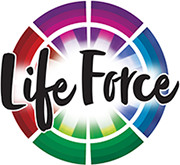by Liz Baudler and Hannah Nelson
Having two writers in a room may or may not lead to a brilliant conversation. But when said two writers describe themselves respectively as an “eco-anarcha-feminst” and a “bipolar ecstatic”, you know you’re in for a memorable evening. So began the July installment of LFAC’s “What is Spiritual Art” panel, featuring Ruby Sara, poet and editor, and Andrew Harvey, author and proponent of Sacred Activism. And right from the beginning the panelists, guided by their work, a set of questions from LFAC’s executive director Joan Forest Mage, and a rapt and engaged audience, enthusiastically dove into defining art, spirit, and their relation.
Spiritual art figured largely in both guests’ personal lives. Ruby Sara began as a reluctant writer, only convinced to put pen to paper by a dedicated third-grade teacher’s poetry lesson. Soon, however, she was caught up in the “passion, intoxication, liberation and wine”, of spiritual art, particularly when she found her muse, the god Dionysus. Andrew Harvey, on the other hand, came to spiritual art in a roundabout way. Though he grew up in India immersed in the rich spiritual traditions of Eastern culture, he ignored this part of himself when he moved back to England. He became a hyper-cerebral Oxford professor at the age of 21, but soon felt that “one could not live by irony and hors d’oeuvres alone”. As he discovered the poet Rumi (of whom he became a scholar), he realized that art could be a way of expressing feeling, and began to explore the more mystical side of life.
As Ruby tried to summarize her spiritual journey, she found herself sidetracked by Andrew’s probing but kind questions. Thus, the two began discussing their views of art. Ruby Sara finds herself drawn to art that appeals to justice, calling art and justice “wild sisters”. An example of the two in harmony would be a photographer’s decision to combat media misrepresentation of women’s bodies by choosing to photograph women who lie outside of the media ideal. For Ruby Sara, “Art is to reflect the beauty of the planet unto itself.”
Agreeing, Andrew Harvey cautioned that there should be no “tofu definition” of spiritual art. He added that art as an act of justice “sets [it] free from [society’s] disgusting obsessions with order”. Art by nature, the panelists agreed, is anarchic, and spiritual art is no exception. To them, the point of art is to amplify feeling, not subdue it. Joan asked Harvey to explore the term “aesthetic”, and its opposite, anesthetic. Anesthetic literally means, “to feel less”, while “aesthetic” implies the embrace of emotions and sensations, the preferred goal of art—and something that both writers felt contemporary work sometimes lacked.
When someone tries to define spiritual art, they might quickly dismiss it by saying that since it’s spiritual, it’s an individual experience. Sacred Activism, Andrew Harvey’s movement, doesn’t let the experience of art stay individual. Sacred Activism works to combine personal spirituality with activism; using your personal beliefs on behalf of a group cause. Harvey claimed that there is a new kind of humanity that is trying to be born, to rise after the current civilization winds down to the doom caused by its own accord. This new humanity, he said, shouts at the people around it to wake up. They will not follow in the self-destructive path of their forbearers and they will not stand for “tofu definitions” of spiritual art. Harvey said the need for Sacred Activism is based on this new humanity, as the audience at LFAC nodded in enthusiastic agreement.
Ruby added that this movement towards a newer, brighter society is where spiritual art can play a huge role. She spoke of people coming down from the mountain of divine experience and trying to share the message of that experience. But mirroring divinity or Earth back unto itself adequately, as Ruby says humanity’s purpose is, requires skill and practice. One cannot merely channel the Almighty and expect to have a work of genius. As Ruby warned, artists may be naturally gifted, but artistic skill requires practice and dedication. In the case of writing, this means a fair amount of editing. That way, the artist can bring justice to the experience and spread and shout their message to those that choose to receive it.
As is usual for the panel, Andrew Harvey and Ruby Sara had never met before, (“in this lifetime”, Harvey joked), yet the duo’s clear chemistry made the night. Laughter and praise flew from both ends of the panelists’ table and into the crowd. Neither writer shied away from giving frank opinions of life, the universe, and the spiritual art world; at one point Andrew Harvey proclaimed, “we’re being policed by Teletubbies”, and the audience burst into laughter and applauded.
The struggle to define questions such as the nature of art, especially in a genre so rich as the spiritual, is almost as important as finding the ultimate answer. Presenting this struggle to a community is even more crucial, as it enables both the artist and those listening to them to create their own definitions and approach new work with a broadened mind. These two witty, intellectual writers did a great job of exploring their craft and pointing their audience in a thoughtful direction. One gets the feeling Andrew Harvey and Ruby Sara would have been willing to stay at LFAC all evening and talk about spiritual art. And the audience would have stayed with them.

0 Comments